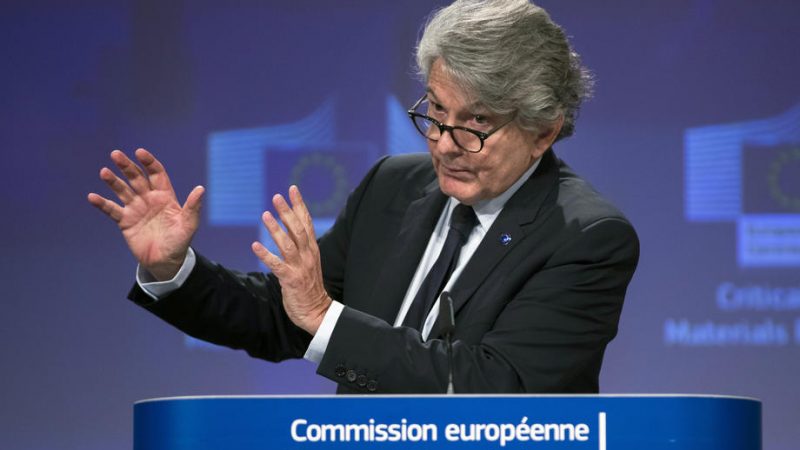By Pierre Tran
Paris. The European Union could raise a total of €30-€40 billion ($35-$47 billion) to finance work on defense and security projects, drawing on the €7 billion budget due to be pledged to the European Defense Fund, Thierry Breton, European commissioner for internal market, said Nov. 13.
“With 7 billion in equity, we can leverage 30-40 billion,” with backing from participants, he said in a video press conference with the Anglo-American Press Association of Paris.
Breton, speaking from Brussels, said the prospective total funding was more than the €30 billion he had expected to raise.
“What we have now is the tool, for first time in our history,” he said.
“We will not do this overnight.”
The European Defense Fund will finance research and development, inviting member states to invest in industrial projects proposed by small and medium companies, as well as prime contractors. The European commission, the executive arm of the EU, had pitched the launch of the fund with a €13 billion budget, with negotiations with member states whittling that down to €11 billion before arriving at €7 billion.
The fund would increase a collective approach in joint investment and widen European investment, particularly among member states such as Poland, Romania and Lithuania, Breton said.
There was much in history and geography which explained why nations in the north and east of Europe had felt “more comfortable” in relying on the U.S., he said.
“We all have our history in defense,” he said.
There were four or five member states with strong arms industries and the aim was to widen the pool of interest in investment.
There were 24 member states backing 16 programs, he said.
“We have room to be inclusive,” he said.
The commission has picked 16 defense industrial projects and three disruptive technology projects for €205 million of support under two pilot programs of the European Defense Fund, namely preparatory action on defense research, and European defense industrial development program, the commission said June 15.
Those projects included work on drones, space technology and unmanned ground vehicles, the commission said. There was also work on a high precision anti-tank missile, warships, airborne electronic attack capability, cybersecurity and active stealth technologies.
A European patrol corvette was one of the projects which has attracted backing from France, Greece, Italy, and Spain, with Italy taking the lead role.
Breton, in the video conference, got up from his desk to find and show a June 2016 report on a European Security and Defense Fund. Breton said he had drafted the report when he was a company chief executive, and had seen the need for higher defense spending in Europe.
The report was written at a time when the then president Barack Obama had called for increased European spending, which president Donald Trump had continued “in his own way,” he said.
Breton showed a picture of his presenting the report to the then French president François Hollande and German chancellor Angela Merkel. He had pitched the idea to the then commission president Jean-Claude Juncker, among other senior officials.
Breton was CEO of Atos, an information technology company, when he drafted the report.
“I played a little role in this,” he said.
Breton, who took up his post as European commissioner last year, was now setting up the fund, which seeks to prime the pump for R& D in military technology.
Breton taught at the Lycée Français school in New York when he was sent abroad under the civil alternative to French military conscription. Breton also taught at Harvard Business School 2007-2008, after serving as economy minister.
On the shelves behind Breton’s desk, there was a model of a Dassault Rafale fighter jet, Galileo navigation satellite — the European alternative to the U.S. GPS system, and a trilobite fossil, which he said was 460 million years old.
Featured Photo: European Commissioner for Internal Market Thierry Breton. [EPA-EFE/FRANCISCO SECO]
In our new book on European defense, we focus on the roles which the European Union might play in the direct defense of Europe as well as analyzing what the EDF could provide in such efforts.
The book can be bought through our website:
The book is available as of October 28, 2020 on Amazon in an e-book version.
The paperback version will be released on December 22, 2020.
Over the next few weeks, the book will be available on a wide range of book sellers as well but the following are offering the e-book now but the paperback on release date: SCRIBD, KOBO, ESENTRAL, and CIANDO.



